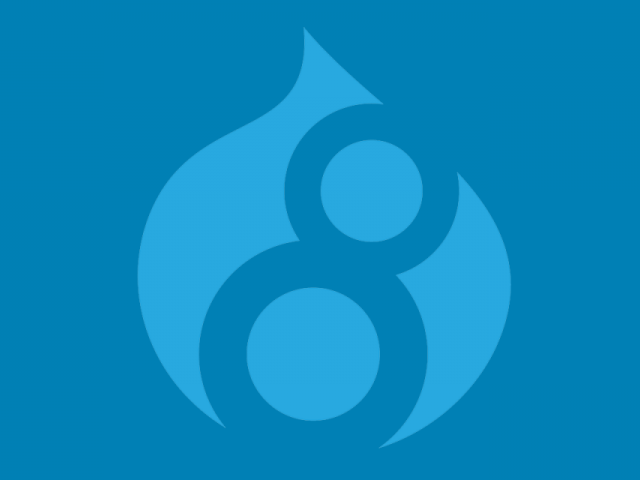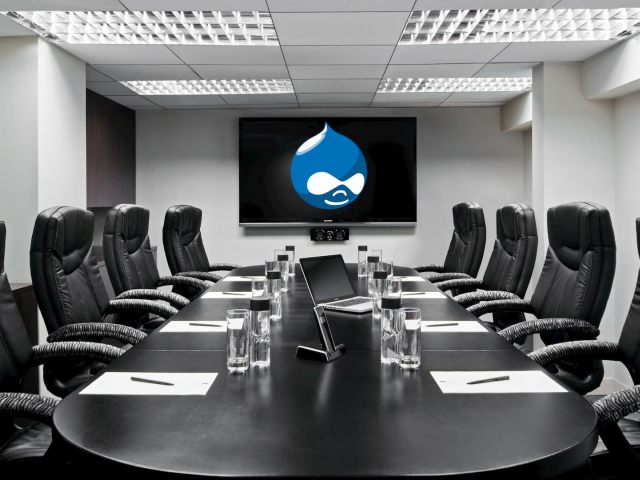
The debate about which CMS is better, probably starts with the first ocurrence of the CMS concept. “Is Drupal better or Wordpress or Joomla?” debate is much more heated topic than “Red Dot better or Interwoven ?” debate during the 90’s, when internet is at its infancy, Truth be told, nobody in either camp is willing to accept the shortcmoings. As a Drupal developer, i might add beforehand, that the question above does not have a definitive conclusion. At least for today. Why? Let’s break it down together…
Market shares of the different CMS
Although both Drupal and Wordpress appeared around 2000’s, (Drupal 2001, Wordpress 2003) both chose their own path. It wouldn’t be wrong if we say that Drupal advanced in a more technical way, while Wordpress focused on ease of use and eye-candy. Wordpress’s easy installation and user-friendly interface made Wordpress choice of many small and medium websites in time. Right now, Wordpress has the lion’s share with 59,5% of the market while Drupal only has 4,9%.
While Wordpress defines itself with “WordPress is web software you can use to create a beautiful website, blog, or app.” (wordpress.org), Drupal defines itself by saying “Open source content management system capable of Millions of websites and applications”. With their own words, Wordpress focuses on visualization, ease of use and targets bloggers While Drupal focuses on providing solutions for big, complicated websites and web applications. This also explains why Drupal has a small market share.
On the other hand, Drupal, although never aimed to be the most used CMS on the market, started gaining more & more market share recently.
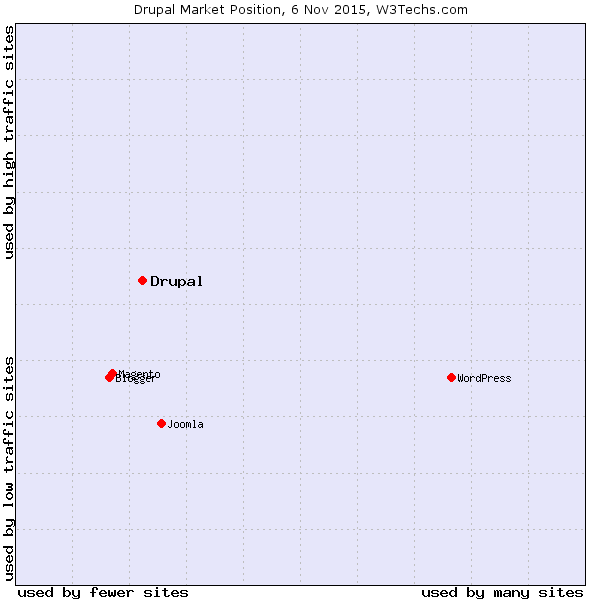
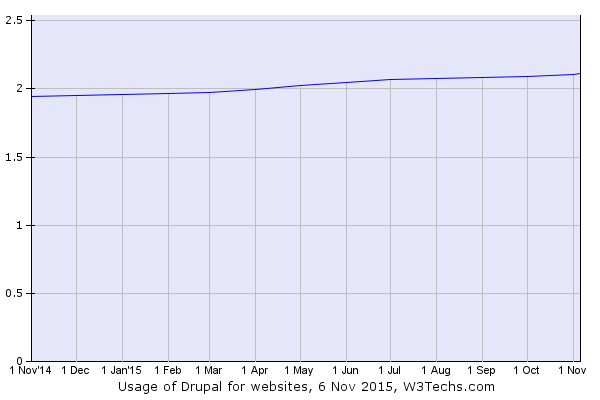
Security
Security is one of the Drupal’s strongholds. Drupal has site-wide security infrastructure and in-depth security reports built-in. This is the main reason why Banks and organizations that keep personal and/or financial data, should absolutely choose Drupal as their weapon of choice. That’s why one of the most attacked website in the World, The White House, chooses Drupal as its CMS.
Meanwhile Wordpress, has many vulnerabilities on its 3rd party extensions. Old, unmaintained extensions and owners forgetting about security updates paves to way to many vulnerabilities and exploits. Paradoxically, Wordpress’s solution for this problem is through 3rd party extensions, which brings up the question of maintaining and updating those extensions too.
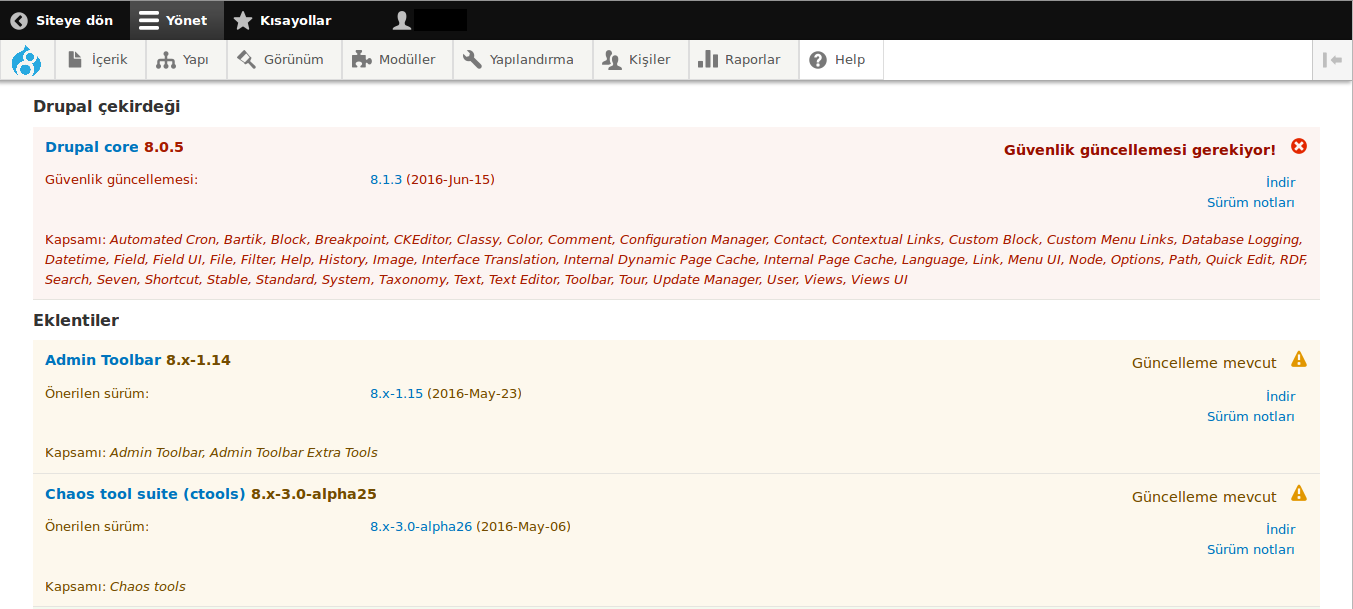
Search Engine Optimization (SEO)
Both Drupal and Wordpress have the infrastructure to build search engine friendly websites. As a well-known fact, having unique and resourceful content has a big impact on SEO. As SEO techniques get more and more reliant on intensive content, ranking higher on search results seems more possible with Drupal. Simplest explanation to this is the fact that Drupal’s ability to manage hundreds of thousands of pages with ease. This is why e-commerce sites with many content (such as amazon.com) or article heavy sites (eHow.com) rely on Drupal.
Recently, search engines started favoring faster websites. Drupal’s built in caching mechanisms which provide faster page loading speeds gives Drupal another advantage. But if Drupal developer doesn’t have technical knowledge about SEO then, it is very possible for SEO to get much worse. This is where a Drupal developer with SEO expertise is the key. On the other hand, it is less likely to make a mistake with Wordpress.
Ease of Customization (Theme, Module etc.)
Wordpress theming system designed to be very easily customized. With little or no HTML - CSS knowledge, you can customize your theme. This is one of the biggest reason Wordpress enjoys a much bigger audience. Also Wordpress is in a more advantageous position than Drupal in terms of free theme options and visualization. With Wordpress’s thousands of free theme options you can both avoid complexity and difficulty and have a well functioning, well looking website with little effort. Every different theme comes with its own plugins and suggestions to make your site look better.
Although you can create visually appealing websites with WordPress, design options remain rather limited when you compare it with Drupal. If you want to make a unique design, Drupal has a lot of superior tools at hand.
When we look at the number of modules/plugins available, Wordpress has 45489 addons and Drupal has 34794 modules. But this is not the whole picture when it comes to module availability.
Drupal’s Views module which is for db query management , Rules module which define conditionally executed actions based on occurring events, Panels module which you can manage your page’s layout easily are all can be regarded as seperate frameworks. These module all provide huge customization options and advantage.
Ease of use
Although Drupal has the capacity to build most complex websites, it requires more technical expertise. From theming to usage, module development to access management, it requires extensive object-oriented programming, PHP, CSS - HTML and Drupal API knowledge. Drupal Learning Curve is illustruted below in a funny way.
On the contrary Wordpress has a simple structure that everybody can learn. With Wordpress, you have the advantage of using thousands of plugins with little CSS-HTML knowledge.
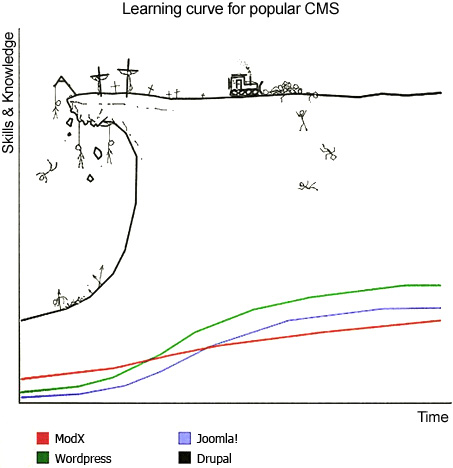
Pricing
With the shortness of learning process and the ability to finish a site from start to end very quickly gives Wordpress a big advantage. In general, a drupal website is up to 2-3 times more expensive than a similar Wordpress site. This, in turn is another big reason for Wordpress to be preferrred in its target audience(Blog sites, corporate sites).
But when the scale grows and Wordpress’s limits are forced, Drupal which is relatively more difficult to develop wins out. Complex applications, content-intensive systems, and their hosting optimizations, multisite requirements, multiple and complex roles, security problems, and many special requests solved with this powerful tool. Of course, these complex and challenging demands also requires higher-budget projects.
Although a website is required to be lightning-fast, SEO friendly, developed in a blink, a visual feast, and doesn’t cost an arm and a leg, development costs can be seen high in our country. Although this is another article’s subject, simply put, offers are too low for the requirements for a software in our country.

Flexibility and stability
Do you want a simple blog? Drupal can handle that. Do you want a website with thousands of users with thousands of articles? Drupal can handle that one too! To be powerful and flexible enough to handle From multilingual to multi-site, Community websites to e-commerce websites all kind of website demands is one of the biggest advantage of Drupal. To add more, Drupal can sustain stability under growing demands just fine, which explains why Drupal is the choice of government bodies and Universities across the globe.
Also, its ability to provide tailor-made solutions for many different kind of concepts makes Drupal developer friendly. Developers like to use this tool at their disposal and the progress it provides.
In case of stability and and flexibility that can be utilized for many systems, both Joomla an Wordpress are left behind by Drupal.
Responsive Design and Development
In this last title that we discuss, there is not a definitive winner. When it comes to mobile support, the first thing comes to mind is the ability to handle images for different screen size. Wordpress handles this with php templates with breakpoints, Drupal handles by the help of “Image styles” and “Pictures” modules.
Many Drupal themes have better flow in mobile subdomains like m.example.com, but this results in some SEO problems.
As a result, Both CMS have mobile support and they tie with each other in this last area.
So if we get back to our original question, "Is Drupal or Wodpress a better CMS?"
In general, it all boils down to this:
If you want a highly complex, multi-usered, secure and flexible CMS, then Drupal it is. But if your priorities favor ease of use, visual appeal and broad range of free themes and lower costs then Wordpress suits you better*.
Maybe because they have to share the same market, maybe because of the competitive approach seen in many areas, there are many articles that jumps to conclusions like “Drupal wins over Wordpress handsdown” and “Wordpress dominates Drupal”. Yet both are siblings because both are free software licensed under the GPL. Both the place very well and they show it in their respective fields. As Binbiriz, we defend the unity and brotherhood of the free software against proprietary software.
*As of July 3rd, 2016 when this article has been written...

